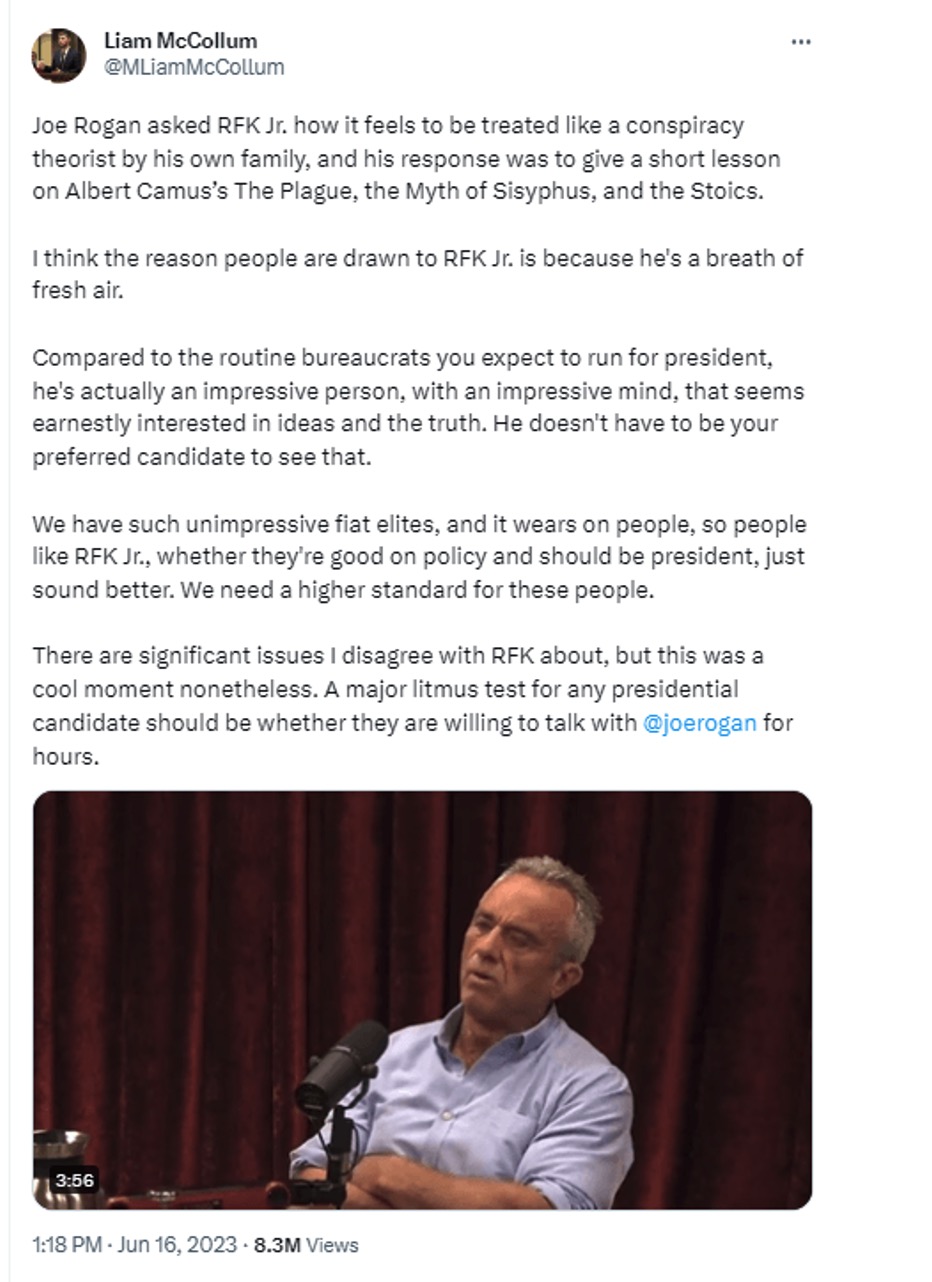Comments
2024 CANDIDATES - Robert Kennedy, Jr. enters the 2024 presidential race as a figure in whom many people across the political spectrum invest their hope for a politics that is at least intelligent, articulate, and honest. He has shown a willingness to engage in reasonable discussion that is vanishingly rare in today’s American political climate. Even those who reflexively bristle at the “anti-vaxxer” label applied to him recognize that he stood up for what he thought was important, in the face of ostracism and ridicule that—as a scion of American and Democratic Party royalty—he did not need.
Nothing exemplifies what makes him a pole of attraction in the current American situation better than this tweet from a self-identified libertarian podcaster:
Joe Rogan asked RFK Jr. how it feels to be treated like a conspiracy theorist by his own family, and his response was to give a short lesson on Albert Camus’s The Plague, the Myth of Sisyphus, and the Stoics.
I think the reason people are drawn to RFK Jr. is because he’s a breath of fresh air.
Compared to the routine bureaucrats you expect to run for president, he’s actually an impressive person, with an impressive mind, that seems earnestly interested in ideas and the truth. He doesn’t have to be your preferred candidate to see that.
We have such unimpressive fiat elites, and it wears on people, so people like RFK Jr., whether they’re good on policy and should be president, just sound better. We need a higher standard for these people.
There are significant issues I disagree with RFK about, but this was a cool moment nonetheless. Leftists of various stripes have also taken hope from Kennedy’s entrance into the political fray, because of his forthright anti-establishment stands on censorship, corporate capture, the Ukraine war, and COVID policies and vaccines, as well for his refreshing open-mindedness. He comes across as the intelligent candidate.

In that regard, to increase his chances with the left, the left, RFK, Jr. has been making the rounds of various left-ish independent media channels. His exchange with Krystal Ball worked in his favor, I think, demonstrating again, even to those who disagree with him on vaccines, that he believes in and will stand up for, the work he has done, and will push back to the “parroting” of establishment talking points. His exchange with Glenn Greenwald on Israel, however, generated a lot of disappointment among leftists who understand the fundamental problem of Zionism and Palestine/Israel, and recognize the parroting of establishment talking points thereon.
Because he’s perceived as intelligent, honest, and open-minded, leftists, like others across the political spectrum, also implicitly hope he will agree with them on positions they would consider the logical conclusions of any intelligent, honest assessment. And for many leftists—an increasing number, it pleases me to note—opposition to Zionism is one such position. Thus, their surprise and disappointment that RFK, Jr. revealed himself to be a “genuinely pretty hardcore Zionist.”
I must say, I don’t know why anyone would be surprised about that. Supporting Zionism is the default position of all major American politicians, including Bernie Sanders. and probably still most citizens.
If RFK, Jr. has boldly gone where other U.S. politicians dare not tread, into the forbidden territory of critiquing the sacred object, vaccines, he has not felt the need of trespassing on the aura of sacrality around that other exceptional object: Israel/Zionism. His bravery in broaching one of these two untouchable—”sensitive and radioactive” as Kennedy puts it—subjects stands out; his comfort in accepting the mandated conventional wisdom about the other fits right in.
Kennedy’s comfort with the conventional wisdom on Israel and Zionism was certainly on display in his interview with Greenwald. The questioning was quite moderate, staying within the framework of allowing criticism of “Israeli policy.” Even in that regard, Kennedy was either shockingly ignorant of those actual policies or was dishonestly evading them by repeating precisely the kind of MSM talking points he so sharply critiques elsewhere. He likes to talk about opening the Overton window, but on this subject, Kennedy sees only through the establishment-fixed aperture of the Overton eye slit.
I mean, does Robert Kennedy, Jr. really think the “historical context” shows that “the Palestinian leadership” is to blame for what happened in “1947 or 1948”? Does he not know that, in 1947-48. Palestinians didn’t “walk away” but were forcibly expelled in what Israeli Jewish historians acknowledge was a program of deliberate ethnic cleansing (the Nakba), which they had every right to resist—a program of expulsion that continues today under the slogan of “Finish ‘48”?
Does he not know that it wasn’t the Palestinian leadership but Israeli Prime Minister Ehud Barak who walked away from the Taba talks (presumably what Kennedy meant by “again in 2001”)? That the talks tended because Barak, knowing that “the concessions Israel would need to make would be suicidal politically,” went home to lose an election to Ariel Sharon who, backed by 62% of the Israeli public, “said he intend[ed] to disregard what transpired at Taba” anyway?
Does he really believe Israel does not have a “deliberate policy….to target civilians and kill them”? He should talk to Human Rights Watch about Israel’s weeks-long “calculated, unlawful” mass killing and crippling of unarmed protestors during the 2018 Gaza protest, where senior Israeli officials ordered snipers to shoot demonstrators who “posed no imminent threat to life”; he should pay attention to the thousands of people shot by those snipers, including 19 paramedics in one day, among them 21-year-old medic, Razan al-Najjar, killed while tending to the wounded; he should hear IDF spokesmen bragged about such shootings (in a quickly deleted tweet): “Nothing was carried out uncontrolled; everything was accurate and measured, and we know where every bullet landed” and explaining to the New York Times that Razan’s killing involved “a very precise identification of a target, where the sniper asks for permission, the officer would grant that permission, and then the sniper would execute that order.” Here’s the precisely identified, deliberately killed, civilian target:

Does RFK, Jr. really believe there’s a “double standard” operating in the U.S. and the West that works against Israel? Can he name another country in the world that could commit such crimes and get barely a drop of protest but a tsunami or apologia from Western politicians and media? (By what, besides Pharma, might they be “captured”?) That the “double standard” is not from those who are not calling for unconditional financial, military, and diplomatic support for repressive and reactionary regimes in “other (Arab) countries”; it is from those who are demanding that perk for a regime whose state-salaried religious authority teaches that science and math are “nonsense” and black people are “monkeys”?
Does he not understand that Israel is indeed a “model democracy”—for a certain segment of its population, like the American South and South Africa were for white people? That, in Israel, you’re not killed “If you’re a transvestite,” you’re killed and your home is demolished if you’re not Jewish and get in the way of what Israeli human-rights organization B’Tselem calls, “A regime of Jewish supremacy from the Jordan River to the Mediterranean Sea: This is apartheid.”?
Greenwald and Kennedy both avoided the fundamental issue of the settler-colonialist project that Israel is. That—the illegitimacy of colonialism— is the single standard Israel demands, and its supporters give it, impunity from.
Beside a brief remark that “a lot of people” do think Israel deliberately kills civilians, Glenn Greenwald did not challenge Kennedy on all these establishment talking points. That’s perhaps understandable. It’s quite disconcerting that someone presenting as the intelligent candidate could repeat so many shallow shibboleths. Kennedy should know that, in the United States in 2023, people on the left cringe at hearing a presidential candidate blithely parrot these talking points about Israel, for the same reason he cringes when hearing Anthony Fauci talk about Remdesivir. They know better. They know what the talking points are hiding.
Greenwald might have asked some specific questions, on Kennedy’s own terms, about what “Israeli policies” he is willing to criticize: Do you support Israel’s annexation of the Golan Heights? Will you abrogate Donald Trump’s recognition of that? Do you acknowledge that Israel possesses nuclear weapons? Do you agree that Israel has a responsibility under UN resolution 194 to allow the Palestinian right of return? Do you accept that Israel has the right to attack Syria at will? Lebanon? Iran? Is there any action or “policy” taken by Israel that would cause you as president to withdraw or even limit financial, military, or diplomatic support?
These are questions a presidential candidate should expect to be asked, and should answer. His answers to those questions would either confirm or erode the public’s confidence in the honesty and forthrightness Kennedy has shown in confronting other establishment taboos.
In regard to his Roger Waters flip-flop, it’s ironic that RFK, Jr. seems unable to see or unwilling to acknowledge that the smearing of Waters as an “anti-Semite” by Zionists—to which he caved—is just like the MSM’s smearing of him as an “anti-vaxxer”? It’s a way of policing a taboo against reasonable discussion of what we are expected to treat as an exceptional, sacred object. It is not anti-Semitism to criticize either Israeli government “policies” or the settler-colonialist, ipso facto apartheid, project that is Zionism. Too many now realize that this is the unavoidable nub of the Palestine-Israel issue, and it’s hard to believe either Glenn Greenwald or Robert Kennedy, Jr. doesn’t know that.
(Jim Kavanagh edits The Polemicist. Follow him on Twitter @ThePolemicist_. This story was featured on CounterPunch.org.)






